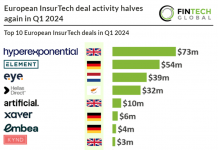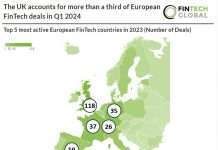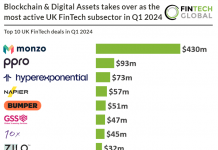While it might only feel like a couple of weeks have passed since we toasted in 2023, we’re already at the midway point of the year. Like the previous few years, 2023 has had its fair share of shocking developments.
One of these was the collapse of Silicon Valley Bank (SVB) which shook the financial sector. SVB became the largest bank to collapse since 2008 and its aftermath caused the closure of Signature Bank. This wasn’t the only high-profile financial institution to hit troubled water. Financial Services major UBS acquired rival bank Credit Suisse in a $3.25bn deal to help prevent a banking crash.
While a dark cloud has overshadowed the financial sector for the past year, it has not all been doom and gloom. There has been a lot of appetite across all FinTech sectors, but WealthTech continues to get a lot of attention. This year has seen WealthTech companies of all sizes raising funds and partnering with traditional players.
Here are the biggest WealthTech trends of H1 2023
The rise of AI
If there is one trend present across all sectors is the rise of AI. While the advancement of AI has been a hot topic for many years, it has reached fever pitch largely due to the popularity of generative AI tools like ChatGPT. Having only launched in November 2022, it already has over 100 million users and records around 1.8 billion monthly visitors.
This technology has brought a seismic change in business and companies around the world are exploring how they can incorporate the technology to transform their operations, whether it is for marketing assistance, lead generation or coding support. There is a huge potential for this technology, particularly within wealth management. For example, it could help to improve personalisation and engagement within the retail investing market. It could even be used to improve an investor’s portfolio, which was hinted at when a fictional fund created by ChatGPT outperformed the UK’s most popular funds.
Kidbrooke recently commented on the rise of generative AI in the wealth management sector. It said, “The rise of AI in financial advice and wealth management is indeed a necessary way forward as it will make customers more comfortable with and appreciative of the benefits automated advice can bring. Moreover, using AI alongside financial analytics tools can transform the customer experience entirely.
“Of course, using AI technology comes with risks. In a regulated sector like financial services, domain expertise and risk management are crucial.”
The use of ChatGPT and other generative AI tools seems inevitable. In fact, 73% of UK investors believe that AI chatbots could offer reliable financial advice in the future, with 42% of investors age between 18 and 34 having already tapped the technology to support their investment decision making. Giants in investment banking are already tapping generative AI. Morgan Stanley is using ChatGPT to support its financial advisors, while JPMorgan Chase is building its own gen AI solution, IndexGPT, to help customers make investment decisions.
However, firms will need to keep an eye on regulators. Several regulators around the world have expressed their plans to increase regulations around AI. Most recently, the European Parliament announced that generative AI developers will need to submit their systems for review before they can be realised commercially. While in the UK, the government released a whitepaper outlining the five principles for the safe use of AI within business and the FCA, PRA and Bank of England also released their own consultation around the use of AI. Similar regulatory measures are happening around the world, including in the US and China.
One area that ChatGPT could really support is the retail investing market. Due to lower returns, the low-end retail investing market has traditionally been given less personalisation, but the development of AI could change this.
Tamara Kostova, CEO at WealthTech company Velexa said, “Retail investors, finally, now hold roughly 50% of the estimated $275trn of global wealth. This means that wealth management firms will refocus on the mass-affluent segment, with a new attitude towards customer centricity.
“Rather than just high touch, white glove service, they’re turning to technology solutions for a blended service model, and utilising AI to create hyper-targeted and customised offerings. The implementation of a single, integrated wealth management platform enables significant levels of automation and business process improvements. “
Robo-advisors gained a lot of popularity among retail investors with their simple to use functions and easy entry point into investing. While these solutions are no longer dominating headlines, there is still a big market for them and Rebecca Crook, Chief Growth Officer, EMEA at digital consultancy, CI&T believes incorporating gen AI could boost its adoption.
Crook said, “Hybrid robo-advisory will continue which will enable traditional wealth managers to help improve efficiency, scale at a much faster pace and reduce costs. The blended approach of advice or planning services by real humans, in a super easy to use platform, really appeals to new younger investors, so this will be a service that will be here to stay and has the option to leverage GenAI.”
The fall of crypto
Following years of increasing hype, excitement around cryptocurrency and NFTs seems to have died down. While the market is still going strong, with companies and regulators still exploring applications, it no longer dominates headlines. In fact, the main news from the sector this year painted a warning sign for the sector.
One of the biggest shocks to the cryptocurrency market was the collapse of trading giant FTX. The firm filed for bankruptcy in November, despite having been valued at $32bn in February. The company’s founder Sam Bankman-Fried is currently on trial for claims he defrauded customers.
Another recent challenge to face the cryptocurrency market was crypto broker Genesis’ filing for bankruptcy protection. The filing came shortly after it was revealed the firm owed over $3bn to creditors and its parent company Digital Currency Group was looking to sell assets in its portfolio to support the company.
Other companies to hit troubled times were Three Arrows Capital, Terra Network, Voyager Digital, BlockFi and many others. Then there is the collapse of stablecoins Luna and TerraUSD earlier in 2022. The poor market condition was dubbed the Crypto Winter and many questioned whether the sector could recover.
Commenting on the state of cryptocurrency, Daniel Harman – co-founder of alternative investment firm Darksquare Capital – said, “The fact that the crypto/NFT hype has almost completely fallen by the wayside has been surprising and slightly refreshing. In 2021 it was borderline impossible to lose money by investing in any asset class but after recent selloffs and interest rate rises investors are having to be more sensible with their investments and look for more stable, risk adjusted returns.”
ESG
Environmental, social, and corporate governance (ESG) has rightfully become a major area of focus for businesses and individuals around the world. Regulators around the world are highly active with building new related frameworks. Just this week alone has seen Australia implement mandatory climate-related financial disclosure requirements, the UK and French governments collaborated to scale Global Biodiversity Credits and the European Investment Bank issued its first-ever digital green bond.
However, it has not all been positive and a little war against ESG has cropped up in the US. Earlier in the year, the US House of Representatives has approved legislation aimed at blocking a new law allowing the consideration of climate and ESG factors by retirement plan fiduciaries. The movement resulted in President Biden issuing the first veto of his presidency.
Following this, Ron DeSantis, the Governor of Florida, headed an 18-state alliance aimed at banning the use of ESG considerations in state and local pension funds. This attempt to block ESG considerations followed a similar move from DeSantis in his home state, as he barred fund managers for state and local entities in the state from considering ESG factors in investment decisions. Elsewhere, Wyoming voted down two pieces of anti-ESG legislation that would have impacted the state’s ability to invest in a range of funds, Arizona ended investigations into ESG investing practices and US Republican congressmen proposed a new legislation to restrict ESG investing in retirement funds.
Moving away from regulators, individuals have expressed their desire for ESG-related products. In the UK, 40% of the public are interested in utilising banking tools to monitor their environmental footprint, however, only 24% of banks currently offer such capabilities. Investors are even willing to opt for lower returns in the support of ESG, with 58% of ESG investors somewhat willing to sacrifice returns in order to achieve ESG goals, according to a Betterment report. Even more shocking is that a third of US investors under that age of 41 are willing to lose more than 10% of their retirement savings to bring about positive change.
CI&T’s Rebecca Crook said, “One of the continued WealthTech trends is socially responsible investing. With governments worldwide laying down more legislation and guidance on large companies to invest in environmental, social and governance (ESG) areas to give back to society means consumers are every bit more savvy to this and looking at how they can play their part.”
With wildfires raging in Canada and heatwaves in Europe, it looks like the world is headed for another hot summer. This is something that Harman believes will increase the demand for ESG, particularly in the green energy space. That said, people are now looking more intensely at where they put their money. Harman said, “I think consumers are waking up to the fact that there’s a lot of ‘greenwashing’ out there now, so they’re digging deeper into not only the financial performance of an investment, but also its environmental/social benefits.”
However, Harman hopes that the second half of 2023 will bring more focus to the social and corporate governance issues. “I feel that the terms ‘ESG’ and ‘environmentally friendly’ are often used interchangeably, with the ‘S’ and ‘G’ less focussed on. But there are lots of interesting and financially sound ways of investing in social change.”
Other trends
Several other trends to take shape in 2023 were noted by those questioned. One of these was a reaction to the rising interest levels as firms look for ways to attract customers from competition. Velexa’s Kostova said, “As interest rates rise, brokerages are adding “idle cash yield” solutions as part of the trend to compete with banks.” This trend sees firms as paying their clients interest on uninvested currency in accounts as a way to attract customers.
Similarly, Darksquare Capital’s Harman said, “Interest rates look like they’re going to continue to rise throughout the year, so I think investors are going to have to continue to ‘hunt down’ yields beyond traditional markets like stocks and bonds. I’d expect demand for inflation linked assets like real estate and commodities to continue to be strong.”
Another trend that Harman has seen “A topic we’re really focussed on at Darksquare, and one we hope will gain momentum, particularly with individual investors, is generating solid risk-adjusted returns. I think a lot of attention is being paid to absolute return and not how much risk was taken to get there.
“For example, Investor A might have made a 20% gain last year by investing in Asset X, whilst investor B only made 12% by investing in Fund Y. When looking at absolute return it looks like investor A was smarter with their money, when in reality I think it’s very important to look at how much risk had to be taken to achieve that result. If Asset A was twice as risky as fund Y, then investor B actually made better decisions on a risk-adjusted basis. I think this concept is very well understood in the professional and hedge fund space, but less so in the retail/individual world.”
For CI&T’s Crook one of the big trends of 2023 has been an improvement in the user experiences of wealthy customers. She said, “Improved holistic views of customers’ personal financial situation. Wealthy customers tend to have complex assets and multiple accounts often owning properties, businesses, crypto and venture capital so the wealth management companies who have stopped working in silos and brought everything into a single view for their clients are offering what the customer wants and needs.
“Even considering Open Banking, which allows customers to view their banking accounts in one place, the movement for wealth management companies is to take this a step further.”
Finally, Kidbrooke added, “It’s now paramount to get a deeper understanding of clients’ preferences, values, and financial objectives to provide holistic and highly individualised recommendations.” At the centre of this is data-driven insights and to achieve this firms need to have a digital core that enables wealth managers to analyse a vast amount of data, including financial profiles, risk tolerances and goals, so they can identify patterns, optimise investment strategies and deliver superior client experiences.
In January, FinTech Global asked several players in the WealthTech sector what they thought would be the biggest trends of 2023. See how accurate they were here.
Keep up with all the latest FinTech news here
Copyright © 2023 FinTech Global











